Last February, the Long-Term Monitoring Team (ESPN) of Doñana's Singular Scientific-Technical Infrastructure (ICTS-RBD) provided support to a research project that studies the hybridation between the two subspecies of the Greek tortoise found in Doñana, Testudo graeca graeca and T. g. marokensis. Technicians of ESPN supported the research project's team during an intensive survey of tortoise individuals at El Puntal Estate, in the heart of Doñana's National Park. The survey counted also with the support of other RBD staff, including its scientific coordinator Carmen Díaz Paniagua, as well as five young researchers enrolled through the research-initiation (JAE) contract at Doñana Biological Station (EBD-CSIC).
Morphology measures and genetic samples were taken in captured individuals. Moreover, tracking devices were attached to them in order to know about their movement patterns. This survey will be repeated several times during this year and the followings, so as to complete the results of the project.
The research project "Distribution changes under climate change: spatial modelling of genetic patterns and fitness to predict species extiction risk", funded by the Ministry of Science, Innovation and Universities, is led by Miguel Hernández University researchers Eva Graciá and Andrés Giménez (see picture)


 Open Call for Research Projects in ICTS-Doñana!
Open Call for Research Projects in ICTS-Doñana!



